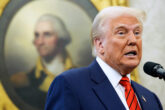August 02, 2019
Don’t Peg Troop Withdrawals to the Political Calendar
Secretary of State Mike Pompeo made news this week by suggesting that President Donald Trump has instructed him to pursue troop reductions in Afghanistan by Election Day 2020. “He’s been unambiguous,” Pompeo said. “End the endless wars. Draw down. Reduce.” After an uproar, the secretary blamed sloppy press reporting and said that any withdrawals of U.S. forces from Afghanistan will be based on conditions on the ground. Yet the comments resonated because of Trump’s clear and oft stated desire to end the war sooner rather than later.
Any pegging of American troop withdrawals to the U.S. political calendar would represent a strategic mistake, and it’s one that Trump himself rightly criticized Barack Obama for making during the previous administration. Obama planned to withdraw all forces from the country by the end of his second term, a commitment he abandoned after watching Iraq descend into chaos.
The Obama administration’s publicly stated reason for announcing calendar-based withdrawals was to induce the Kabul government to take on greater responsibility, stop free riding on the American presence, and improve governance. Nothing of the kind happened, and now there appears a different public rationale for timed American troop withdrawals. Such specificity, it is suggested, will show the Taliban that the United States is serious about ending the war and jump-start the diplomatic effort spearheaded by Special Representative Zalmay Khalilzad. Trump has authorized direct talks with the Taliban (rather than the “Afghan-led, Afghan-owned” model that for years never produced results) and has been willing to put the U.S. troop presence on the table, which is the Taliban’s key concern. While it is still hard to imagine a diplomatic outcome that ends the war on terms protective of American interests and the Afghan people, it can’t be ruled out.
Read the full article in The Atlantic.
More from CNAS
-
Afghanistan: Why Does Trump Want to Retake Bagram Air Base?
Lisa Curtis, senior fellow and program director at the Center for a New American Security joined Deutsche Welle to discuss President Trump's comments on the U.S. regaining con...
By Lisa Curtis
-
A Failure to Plan: Examining the Biden Administration’s Preparation for the Afghanistan Withdrawal
Afghanistan, Iraq, and Vietnam. One failure is a horrible accident; two failures are a tragic coincidence; three failures are a disturbing trend that shows the U.S. government...
By Christopher D. Kolenda
-
Against All Odds
Eighteen months after taking power, the Taliban is intensifying its repression of Afghan civil society and cracking down on the rights and freedoms of all Afghans, especially ...
By Lisa Curtis, Annie Pforzheimer & Jan Mohammad Jahid
-
To Help Afghanistan, Engage Its Political Opposition
The effort to help Afghans shape a better alternative should begin now....
By Richard Fontaine & Lisa Curtis




